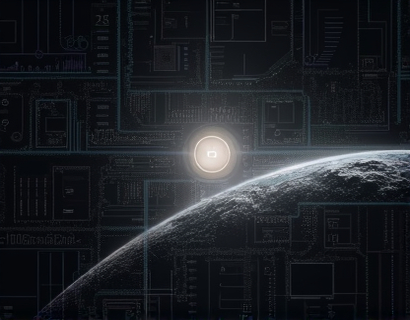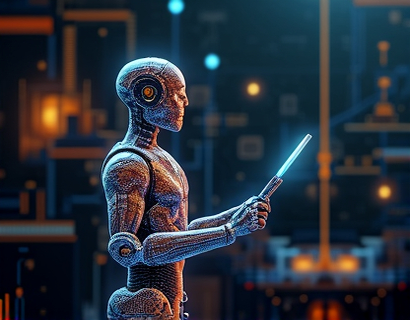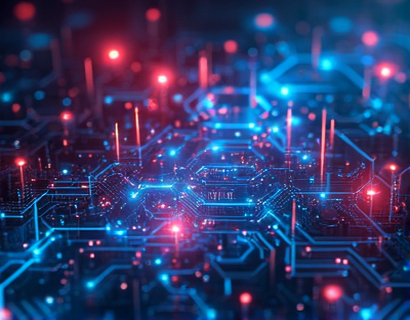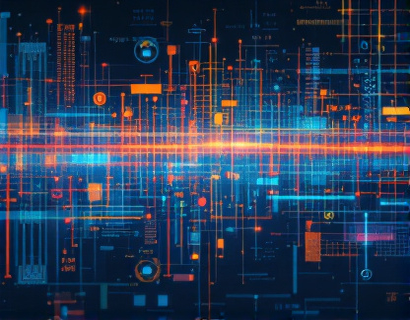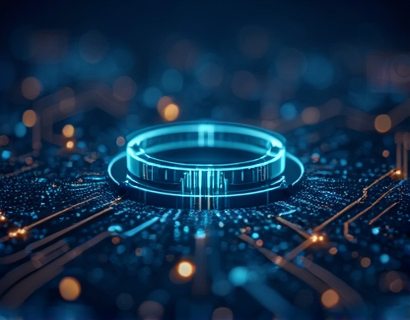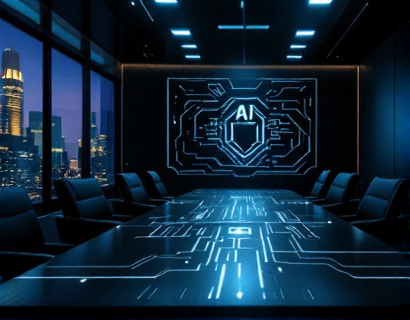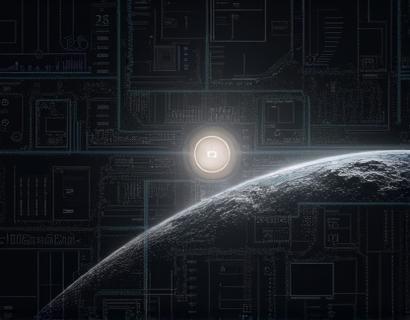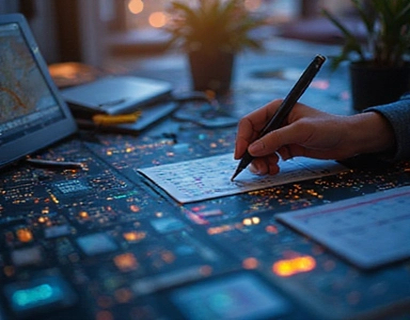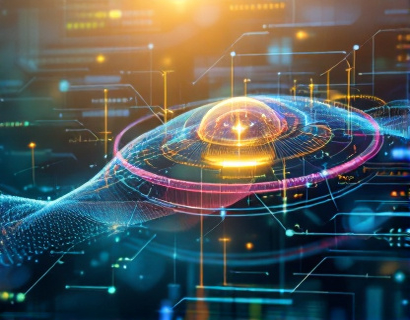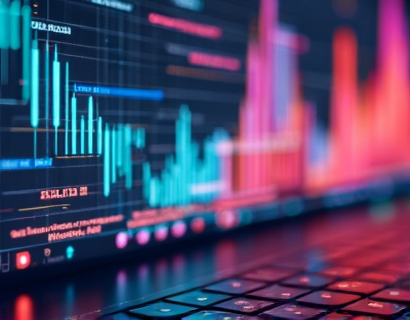Revolutionizing App Ecosystems: The Synergy of Crypto and AI
The integration of cryptocurrency and artificial intelligence (AI) is ushering in a new era of digital innovation, fundamentally transforming app ecosystems and user interactions. This convergence of technologies is not just a trend but a pivotal shift that promises to enhance efficiency, security, and user experience across various digital platforms. As we explore this intersection, it becomes evident that the future of technology is increasingly dependent on the seamless blend of blockchain and advanced algorithms.
Understanding the Basics: Cryptocurrency and AI
To grasp the transformative potential of crypto and AI, it's essential to understand the fundamentals of both technologies. Cryptocurrency, often referred to as digital or virtual currency, operates on blockchain technology, a decentralized ledger that ensures transparency, security, and immutability. Blockchain's inherent characteristics make it an ideal foundation for various applications beyond currency, including supply chain management, identity verification, and smart contracts.
Artificial intelligence, on the other hand, encompasses a range of technologies designed to simulate human intelligence processes such as learning, reasoning, and self-correction. AI algorithms can analyze vast amounts of data, identify patterns, and make predictions or decisions with minimal human intervention. The combination of these two technologies creates a powerful synergy that can revolutionize how apps function and interact with users.
The Role of Blockchain in Enhancing Security and Trust
One of the most significant contributions of blockchain to app ecosystems is the enhancement of security and trust. Traditional app ecosystems often rely on centralized servers, making them vulnerable to hacking and data breaches. Blockchain's decentralized nature eliminates this single point of failure, distributing data across a network of nodes. This distribution ensures that even if one node is compromised, the entire system remains secure.
Moreover, blockchain provides a transparent and tamper-proof record of transactions and interactions. Smart contracts, self-executing contracts with the terms directly written into code, automate and enforce agreements without the need for intermediaries. This not only reduces costs but also minimizes the risk of fraud and errors. In the context of app ecosystems, smart contracts can streamline processes such as in-app purchases, subscription management, and data sharing, ensuring that all transactions are secure and verifiable.
AI-Driven Personalization and User Experience
The integration of AI into app ecosystems significantly enhances user experience through personalized interactions. AI algorithms can analyze user behavior, preferences, and patterns to deliver tailored content and recommendations. For instance, a music streaming app can use AI to curate playlists based on a user's listening history and real-time mood detection. This level of personalization not only increases user engagement but also fosters a deeper connection between the app and its users.
Furthermore, AI-powered chatbots and virtual assistants can provide instant and accurate support, handling a wide range of queries and tasks. These AI-driven interfaces can operate 24/7, ensuring that user needs are met at any time. In complex applications like e-commerce platforms, AI can assist in product recommendations, price optimization, and inventory management, all of which contribute to a smoother and more efficient user experience.
Decentralized Applications (DApps) and Their Potential
Decentralized applications, or DApps, represent a significant evolution in app ecosystems, leveraging both blockchain and AI to create decentralized, autonomous systems. Unlike traditional apps that rely on centralized servers, DApps run on a blockchain network, ensuring that no single entity has control over the entire system. This decentralization not only enhances security but also promotes transparency and user ownership.
AI can further enhance DApps by providing intelligent decision-making capabilities. For example, a decentralized finance (DeFi) platform can use AI to optimize lending and borrowing processes, predict market trends, and manage risks more effectively. The combination of decentralization and AI in DApps opens up new possibilities for decentralized governance, community-driven development, and innovative financial services.
Supply Chain Optimization Through Blockchain and AI
Supply chain management is another area where the synergy of blockchain and AI can drive significant improvements. Traditional supply chains are often plagued by inefficiencies, lack of transparency, and high costs. By implementing blockchain, each step of the supply chain can be recorded in a secure and immutable manner, from raw material sourcing to final product delivery. This transparency ensures that all parties have access to real-time, accurate information, reducing the risk of fraud and errors.
AI can complement blockchain by analyzing the vast amounts of data generated throughout the supply chain. Predictive analytics can forecast demand, optimize inventory levels, and identify potential bottlenecks. For instance, an AI system can analyze historical data and market trends to predict future demand for a product, enabling manufacturers to adjust production accordingly. This not only reduces waste but also ensures that products are available when and where they are needed.
Enhancing Identity Verification and Privacy
Identity verification and privacy are critical concerns in the digital age, and the combination of blockchain and AI offers robust solutions. Blockchain-based identity systems can provide users with control over their personal data, allowing them to share specific information with apps and services as needed. This approach not only enhances privacy but also reduces the risk of identity theft and data breaches.
AI can further strengthen identity verification processes by employing advanced biometric technologies and behavioral analytics. For example, AI-powered facial recognition and voice authentication can provide secure and convenient ways to verify user identities. Additionally, AI can monitor user behavior patterns to detect and prevent fraudulent activities, ensuring that the app ecosystem remains safe and trustworthy.
Challenges and Considerations
While the potential benefits of integrating blockchain and AI in app ecosystems are substantial, there are also challenges and considerations that need to be addressed. One of the primary challenges is the technical complexity involved in developing and maintaining these systems. Both blockchain and AI require specialized knowledge and resources, which can be a barrier for smaller developers and startups.
Another consideration is the regulatory landscape. As these technologies evolve, governments and regulatory bodies are beginning to establish guidelines and frameworks to govern their use. Compliance with these regulations is crucial to ensure that apps remain legal and ethical. Developers must stay informed about regulatory changes and adapt their solutions accordingly.
Scalability is another important factor. While blockchain and AI offer powerful capabilities, scaling these solutions to handle large volumes of data and transactions can be challenging. Developers need to design systems that can scale efficiently without compromising performance or security.
Future Prospects: The Next Generation of App Ecosystems
Looking ahead, the integration of blockchain and AI is poised to drive even more innovative developments in app ecosystems. One exciting area is the emergence of autonomous systems that can operate with minimal human intervention. These systems can self-manage, self-optimize, and self-heal, creating highly resilient and efficient digital environments.
Another promising direction is the development of cross-chain interoperability, allowing different blockchain networks to communicate and interact seamlessly. This interoperability, combined with AI's ability to manage and optimize complex networks, can lead to the creation of unified, global app ecosystems that transcend traditional boundaries.
Furthermore, the rise of Web 3.0, a decentralized internet powered by blockchain, will play a crucial role in shaping the future of app ecosystems. Web 3.0 applications will leverage AI to provide users with unparalleled levels of control, privacy, and personalization. The convergence of these technologies will redefine how we interact with digital platforms, making the internet more democratic and user-centric.
In conclusion, the synergy of cryptocurrency and AI is revolutionizing app ecosystems, offering enhanced security, personalization, and efficiency. As these technologies continue to evolve, they will unlock new possibilities for innovation and connectivity, paving the way for a more advanced and inclusive digital future.



